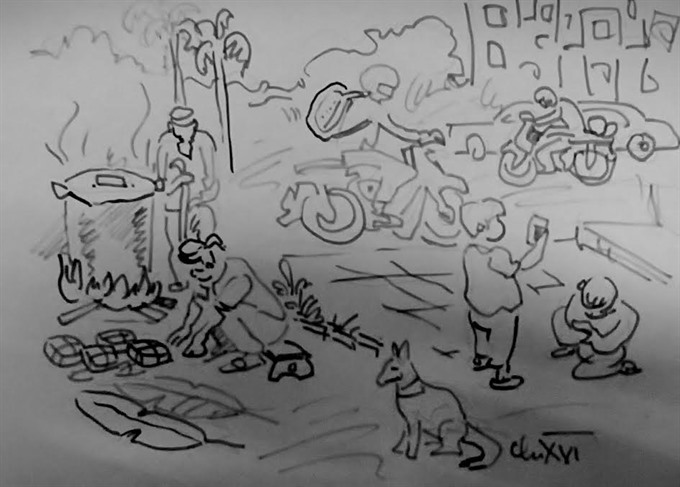 Talk Around Town
Talk Around Town

Although the way Vietnamese celebrate the Tết (Lunar New Year) Festival has changed, they still maintain the tradition of preparing offerings for ancestor worship and buying new domestic utensils well ahead of time.
 |
by Mai Hiên
HÀ NỘI -- Although the way Vietnamese celebrate the Tết (Lunar New Year) Festival has changed, they still maintain the tradition of preparing offerings for ancestor worship and buying new domestic utensils well ahead of time.
Still some 45 days away, preparations for the festivities are long under way all around the country.
Tonnes of processed food have been prepared by Vietnamese enterprises for the season.
People are planning new haircuts and clothes, sprucing up their homes, decorating and stocking up on food and utensils. Gifts of food are being prepared for good friends and relatives.
Most households used to save money for the Tết occasion months in advance, and farmers accelerated pig and chicken breeding, as well as vegetable cultivation.
But now, produce and goods are far more readily available and much of the food preparation can wait until closer to the January 28 festival.
For many Vietnamese, Tết is an occasion for reunions with family members, those living and those who have passed on. People, particularly those living far from their hometowns, try to find time to return home to celebrate with their family.
However, in recent years, many people, especially the well-off, choose to travel rather than stay home during the week-long festival. "Travelling is a good way for people to regain their spirit after working hard for a year," said Nguyễn Kim Ngọc, a teacher in Hà Nội.
Travelling together creates new experiences for family members, forming close bonds, she says. The advance preparations also serve a purpose, in her view. By busying themselves with cooking and cleaning their houses prior to Tết, families gain a better understanding of each other, she says.
But after the first day of the Lunar New Year, people should do what they feel like doing, she said.
This opinion was shared by Nguyễn Huy Nam from northern Thái Bình Province.
"I chose travelling during the festival as it was a good chance for me to learn the way people celebrate Tết in different regions", he said.
So what is the most important activity for Vietnamese during the festival?
"I think Tết festivities are a good opportunity for people to indulge in eating, drinking, and other enjoyable social activities," said Nguyễn Văn Thành, 78, a Hanoian.
He feels sad that traditional habits like preparing bánh chưng (square glutinous rice cakes) have somewhat faded over the years. Many families choose to buy a couple of bánh chưng in the market or supermarket, he said.
The preparation of bánh chưng was often a draw for the entire family.
Elders and children set around the pot chatting while the bánh chưng was being cook. They stayed awake until the cakes were ready after about 15 hours. The children were eager to taste their own small cakes.
I totally agree with him.
I remember that I was about ten when my parents let me wrap a bánh chưng for the first time. I spent the whole night cooking the cake with them. That was the best ever experience and I’ve never forgotten.
Nguyễn Vân Hà, a bank clerk in Hà Nội, said she wanted to wonder around the city during Tết when the streets are calmer. The city empties of many of its residents, traffic thins out and most shops are closed for a few days. Hà said she loves Tết because she gets more time for sleeping and eating.
But many Vietnamese women complain that they are fed up with having to prepare, buy, cook, clean and other chores ahead of and during Tết. They are left feeling exhausted and the festival is no longer a holiday or festive occasion for them.
To make Tết a time for reunions and relaxation, Vietnamese women need the help of their spouses to ease the burden.
But all in all, I think the long-standing traditional customs should be preserved as Tết helps to improve Việt Nam’s social relationships, makes people friendlier and brings them closer to each other. -- VNS




